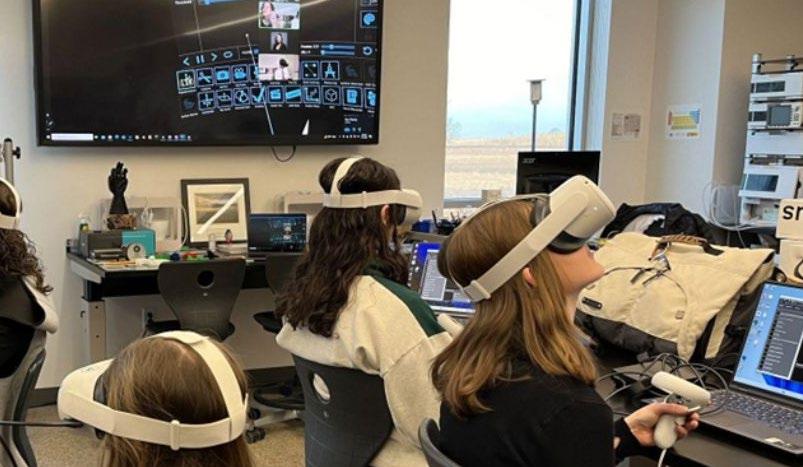
4 minute read
From Vision to Reality: Establishing Cyber Tech Programs in K-12
By the Alabama School of Cyber Technology and Engineering
In today’s rapidly evolving digital world, the integration of cyber technology in education is no longer just an option—it’s a necessity. Recognizing this imperative, the Alabama School of Cyber Technology and Engineering (ASCTE) has emerged as a national model for innovative education aimed at meeting our nation’s critical intelligence needs. Established in 2018, ASCTE is the first tuition-free residential high school dedicated to integrating cyber technology and engineering across all academic disciplines. This pioneering institution not only educates students but empowers them to bridge the significant gaps that exist in the cyber workforce across all industries.
ASCTE: A Beacon of Educational Innovation
ASCTE stands as a one-of-a-kind school where faculty members, made up of industry subject matter experts, educate and mentor students in high-level cyber protection and engineering principles. By combining real-world experience with the highest academic rigor, ASCTE prepares students to thrive in both higher education and the highly technical workforce. Students are given opportunities to apply their learning practically, ensuring that they are not just learning theories but are capable of implementing cyber protection effectively in real-world scenarios.
The school’s commitment to excellence is further demonstrated by its growing partnerships with government and industry leaders, which enhance the level of instruction and foster an environment of innovation. These collaborations have facilitated the construction of stateof-the-art facilities that provide the ideal learning environment students need to excel.
By combining real-world experience with the highest academic rigor, ASCTE prepares students to thrive in both higher education and the highly technical workforce.
Essential Tips for Schools Developing Cyber Programs
For schools looking to establish their own programs in cyber technology and engineering, ASCTE President Matthew Massey suggests three key considerations to keep in mind:
1. Embrace the Debate on Technology Integration
Education systems must engage in the ongoing discussion about the role of technology in school curriculums. Given that technology impacts every sector, it’s vital for educators to understand its pervasive influence and incorporate it into various areas of study, not just relegated to computer science classes.

2. Utilize Subject Matter Experts
A common challenge in cyber education is the reliance on general computer science teachers to teach specialized courses. Schools should leverage subject matter experts and individuals who actively use technology in the field. This approach ensures that students receive instruction rooted in current industry practices and real-world applications.
3. Prioritize Hands-On Experience Over Certifications
While certifications hold value, the future of education in cyber technology lies in providing students with hands-on experience. Practical applications enhance understanding and prepare students for the challenges they will face in the workforce. Programs should prioritize experiential learning opportunities through labs, projects, and industry internships.

ASCTE Case Study
Governor Ivey’s signing of ACT 2018-480 into law marked a significant step in Alabama’s commitment to advancing cyber technology education. Since opening its doors to 72 freshmen and sophomores in August 2020, ASCTE has quickly become a benchmark for what can be achieved when visionary leadership meets educational innovation.
Staying true to its mission of ensuring all students achieve high levels of learning to be successful in implementing cyber protections into the engineering lifecycle, ASCTE began the execution of two new initiatives in fall 2024.
1. Advancing Cyber Concepts and Engineering Learning (ACCEL) is an outreach program by ASCTE that assists teachers, administrators, and superintendents across the state in replicating cyber technology & engineering studies within their own schools. The program provides educator workshops, cyber curriculum implementation, standard-based grading pedagogy, K-12 curriculum support, and training for IT specialists. Each ACCEL camp is customized to meet the needs of schools and districts across Alabama.
2. Alabama Cyber Range will offer virtual environments that simulate real-world cyberattacks and networks. The range will be used by students across the state for training, testing, and research to help users learn how to respond to cyber challenges

About Us
The Alabama School of Cyber Technology and Engineering (ASCTE) is the nation’s only high school focused on the integration of cyber technology and engineering into all academic disciplines. ASCTE is a public, residential magnet high school serving students throughout the state of Alabama. Tuition is free for Alabama residents.
The ASCTE faculty is composed of field and subject matter experts providing students the highest quality of instruction focused on embedding cyber protections into the engineering cycle.
ASCTE is proud to disrupt typical representation in STEM industries with a student population of 42% minorities.











